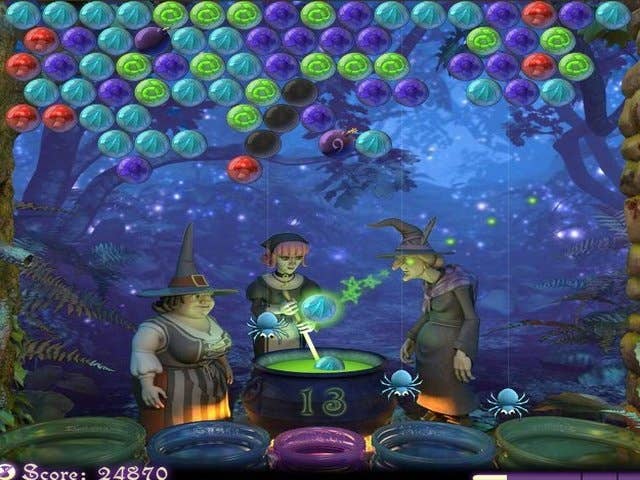Queen to King's Castle
Catharina Lavers Mallet on her move from Playfish to King.com
When the fast-rising Catharina Mallet left EA's Playfish earlier this year, leaving behind an as yet unannounced new social IP which was tipped to be something of a big thing for the publisher, a few eyebrows were raised. Whilst the impeccably professional Mallet refused to talk about where she might be going, or to rubbish her previous employer, the rumour mill inevitably started grinding.
Now settled in at King.com, in charge of the up and coming outfit's brand new London studio, Mallet's departure from EA makes a lot more sense - but she's still not letting anything slip about that mystery Playfish IP. We sat down for a chat with her at Develop in Brighton to find out what she's up to, and what enticed her to the King.com payroll.
I was at playfish for two years, as a product manager on Pet Society. Back in the Wild West days of platforms changing every day without anyone really knowing why - when we were still figuring out what worked and didn't - it was a fun time. Then I moved on to be a producer on The Sims Social, brought that through to live, ran it live for a month or so then moved on to another big IP-based title. Then left in May.
Before that I was a typical career changer. I've always been a product person. I was working in enterprise software and things like that - consulting to banks - and I realised that I wanted to move into something that's more consumer facing and more fun so I went back to business school then went to Playfish and now I make fun for a living, which is kind of the best thing ever.
In many ways I think I'm very typical of our demographic, which is what I think makes it such a good fit. I played Double Dragon with my brother when I was a kid, I got addicted to Sonic - all that stuff. But then I got to be 13 or 15 and I realised, "oh, playing games that's not cool, that's not for girls", so I stopped. I've kind of had to re-learn how to play, if that makes sense.
People asked me if I was a gamer and I'd say, no, absolutely not. But, they'd ask if I'd played Tetris, or Road Rash - all this stuff that I was totally into but I would never have identified myself as a gamer. So it's really fun to talk to our players and realise that we're all sort of in that similar boat. "Oh, I'm not a gamer, but I love Bubble Witch Saga and I play it four hours a day."
"In many ways I think I'm very typical of our demographic, which is what I think makes it such a good fit"
Absolutely - they think gamers are people who sit in their mum's basement, that you can't have a life if you're a gamer. I think one of the things that's really cool about these ultra-casual games that we're making is that they fit into your life, as opposed to you fitting your life around them.
Amazing - just an incredible ride. PlayFish was the first job I ever had where I realised that coming to work could be really fun. I think that when you really enjoy what you're doing, you're going to be good at it. In an industry that's as new as social games there's just so much headroom for growth, both personal and industry growth. There were so many things that need to be done, and so many opportunities that you could just go for it.
Sometimes, people will notice that and say, "she seems to be running in the right direction, let's give her a bigger ball." It was a great time.
Partly it was the focus. I think also it's the rapid growth - the King.com story is really an amazing one. This time last year we had 300 million games played a month, now we have 3 billion.
We have 150 games that we've made, all on the skill side. We have a really good sense of what players like and what they don't like - we're now steadily taking the games that work and the mechanics that work and reinterpreting them for Facebook. Adding the depth and the social and the persistence - all the stuff that we know makes social gaming fun.
The likelihood of success for these games is already quite high because we know the players like those mechanics. Now we can move into mobile it feels like we're just at the beginning of this rocket ship. We're already number 2 on the platform. Some people think we've come out of nowhere but the company has been around for ten years so we've worked out a lot of the kinks about building a culture - which is another of the reasons I wanted to join.

The final reason is that the opportunity to build something from scratch like this doesn't come along very often. It's basically like creating a start-up, but within something that you already know is successful. From a cultural fit point of view it's very fun, it's very non-hierarchical, it's very Swedish. We care very much about our employees, it feels very family like.
I'd say so - we're fairly collaborative. I think my job as studio leader is very much to work with leadership and work out where we want to go then make it possible for my team to get there. I'm very much a believer in the ethos of pushing the control down as far as you can. When you're in a space which moves as quickly as social does - when the roadmap changes so quickly - then if you wait around until someone can approve everything then you're going to be too late.
It really only works when people have the licence to make those decisions independently and quickly. That's pervasive throughout the industry.
"Every studio has its own identity, but you always know who's on the end of the phone"
In terms of producing different games, there are some studios that are focused on mobile, but the London studio will be doing social and mobile. One of the really cool things that we're doing is the cross platform play, so it really makes sense that we develop both together.
One of the things I'm doing at the moment is spending half a week in Sweden and half in London - it's very important that I understand the King.com culture. The new studio is a great opportunity to experiment a little bit - to say which things we want to keep an not. There's a real focus on relationship building - we want to be autonomous but we talk a lot about one kingdom. We get together a couple of times a year to do a bit of learning and a little bit of partying. Every studio has its own identity, but you always know who's on the end of the phone.
Oh absolutely. We're just starting. The goal is to get to forty people but we're being very careful with the first few hires because they'll set the tone for everybody else.
I think they go hand in hand. Facebook is the best acquisition tool in the history of acquisition. King.com had a very solid business right up until last year, but as soon as we went on to Facebook you can see the before and after uptick. I think there's still a lot of opportunities to be had there.
What's nice about the cross-platform gaming is that they can go hand in hand like that - you don't have to pick one or another.
No thoughts at all. [laughs]
"Zynga is a very good fast follower. It seems to be one of the truisms of the space, I think. If you make a good game, Zynga will copy it"
It's one of the most sincere forms of flattery, right?
Ha - Zynga is a very good fast follower. It seems to be one of the truisms of the space, I think. If you make a good game, Zynga will copy it.
I think that if you're an intelligent person, you're always paying attention to what your competition is doing. Good ideas come from all over the place - you're always learning from all from people who are good at what they do.
We have a well-deserved reputation for making really good quality games, we're good at that so we don't need to copy anyone.

